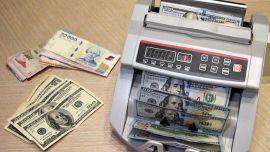Argentina’s government prepared two different sets of measures on Saturday aimed at limiting operations in the parallel exchange rate known as the blue-chip swap rate.
The securities regulator, known as the Comisión Nacional de Valores (CNV), flagged a set of restrictions to local brokers that will reduce the amounts made on bond sales each week and modify the timeframe for brokers to hold certain assets, according to two people with direct knowledge of the matter.
The regulation by the CNV is due to be published Monday in the Official Gazette, said the people, who asked not to be named because the decision is not yet public.
A CNV spokesman declined to comment.
The Central Bank has already imposed its own curbs on the blue-chip swap rate, publishing a rule late Saturday that limits access to that market.
The move accelerates the government’s effort to clamp down on the country’s implicit exchange rates, derived from buying assets in local markets and selling them abroad, which have seen a resurgence in recent years as a result of capital controls.
Last month, officials asked local brokers to limit trades on some of these parallel rates to reduce volatility. Argentina already controls the spot peso through a crawling peg, and has been slowing the rate of its depreciation as a key tool to curb an expected rise in inflation.
The new Central Bank rule will also have far-reaching implications for related companies. If a firm’s controlling shareholder is accessing the blue-chip swap market, any existing caps on purchases of a foreign currency will also apply to the other companies it holds. It also prohibits the swap between local bonds and American bonds in operations of “Dollar Cable.”
Among the main measures that the CNV is expected to publish Monday include:
- Reducing an existing amount of time that brokers have to hold foreign currency bonds before they can be sold in offshore markets, known locally as “parking period,” from three to two business days
- Setting the “parking period” on foreign bonds that brokers want to sell in local markets at one business day
- The parking period on bonds purchased that would be settled in pesos will be set at two business days
- Cutting the balance of foreign currency bonds settled offshore by half to 50,000 nominal bonds from 100,000 previously for individual accounts
by Ignacio Olivera Doll, Bloomberg



















Comments